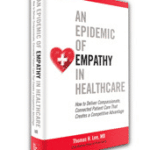The Best Strategies in Healthcare Begin with Empathy [Podcast]
 [Leadership Podcast Series] In this insightful and inspiring interview, Thomas H. Lee, MD, Chief Medical Officer of Press Ganey, and Stewart Gandolf, CEO of Healthcare Success, discuss An Epidemic of Empathy in Healthcare. In an increasingly consumer-driven health care environment, organizations must compete on delivering value for the patient.
[Leadership Podcast Series] In this insightful and inspiring interview, Thomas H. Lee, MD, Chief Medical Officer of Press Ganey, and Stewart Gandolf, CEO of Healthcare Success, discuss An Epidemic of Empathy in Healthcare. In an increasingly consumer-driven health care environment, organizations must compete on delivering value for the patient.
The traditional physician-centered world of health care delivery has morphed into a consumer-savvy, patient-centric environment. And doctors, health systems and hospitals are increasingly challenged to improve performance, deliver greater value, reduce patient suffering and improve the patient experience.
Our podcast discussion today, Dr. Thomas Lee, Press Ganey CMO, examines “the strategic imperative for provider organizations to employ a more patient-centric approach in order to capture and retain business.”
The springboard for this informative interview centers on Dr. Lee’s perceptive and instructive book: An Epidemic of Empathy in Healthcare: How to Deliver Compassionate, Connected Patient Care That Creates a Competitive Advantage. It’s on our “highly recommended” reading list.
The core of Dr. Lee’s thought leadership in consumer-driven health care—and many of the essential points in today’s discussion—relate to how the best strategies in healthcare delivery begin with empathy. This discussion illustrates a new way of thinking about the patient experience, building loyalty, and using social science models to accelerate this approach. Highlights from this podcast include:
ABOUT ORGANIZING CARE AROUND PATIENTS’ NEEDS: In the big picture, there has been tremendous progress in science and healthcare. This includes a focus on doctors “doing what they do,” but forgetting about the patient who is feeling cold while in the hallway waiting to see the doctor. We have to organize to counter the side effects of progress that take clinicians away from caring for the individual with genuine empathy.
ABOUT THE BOOK, EPIDEMIC OF EMPATHY: Dr. Lee explains that his job is to help patients, clinicians and hospitals succeed in today’s healthcare environment. The economic pressures are real, but healthcare can’t be just about money. So, to make healthcare better, competition on value is the right framework. The title of the book, suggested by Dr. Lee’s wife, is rooted in the science of social networks where values—both good and bad values—can spread from person to person. And in that context, healthcare needs an “epidemic of empathy,” with the delivery of empathic and coordinated care—and for this to be a social norm.
ABOUT PROVIDER TEAMS: Teams, focused on the patient’s needs, is the better path to care delivery than a bunch of individuals. A decade ago, many physicians thought that “a team” was a bunch of people who “do what I say to do,” extending my ability to get done what I do. That’s not what a team is about. Perhaps five years ago, a team was considered to be a multidisciplinary group—nurses, pharmacists, doctors—efficiently working at the top of their license.
Although that’s a step in the right direction, a real team is an adaptable, resilient group of people who will do what it takes to meet the needs of patients. And, in the context of military team, for example, team members would never want to disappoint their colleagues or do less than everything to answer the needs of the patient.
ABOUT THE IMPORTANCE OF COMPETITION: The alternatives to competition are bad for healthcare. The absence of competition leads to regulation; society and government have few options except to impose regulations that, ultimately, do not drive improvement and be bad for care. But when providers are competing to deliver the best care as efficiently as possible, it drive creativity and improvement.
Competition is nerve-racking; you don’t have real competition unless there is fear. As unpleasant as it sounds, we do our best work when the stakes are high. And fear that you might lose business to someone else—because they’re doing a better job, or doing it more efficiently—inspires and motivates better performance.
ABOUT THE REDUCING SUFFERING: We don’t use the overly emotional word “suffering” much in healthcare. But suffering is such as shocking word that healthcare providers may need that level of alarm to inspire continuing awareness of the true needs of the patient—and doing what it takes to reduce suffering. This is not just the pain that they may be experiencing, but also the fear, anxiety and the confusion. As physicians and teams, we need patients to feel that their care is empathic, that we care for them, that it is coordinated and it is safe.
Professional healthcare providers tend to take empathy for granted because we know we are good people and that we’re trying hard. We tend to focus on technical quality, but patients, on the other hand take the technical stuff for granted, but are wondering if anyone cares about them. The truth is, we need both caring behavior and technical excellence.
 We highly recommend Dr. Lee’s book, An Epidemic of Empathy in Healthcare: How to Deliver Compassionate, Connected Patient Care That Creates a Competitive Advantage. It is available on Amazon in Kindle or hardcover format.
We highly recommend Dr. Lee’s book, An Epidemic of Empathy in Healthcare: How to Deliver Compassionate, Connected Patient Care That Creates a Competitive Advantage. It is available on Amazon in Kindle or hardcover format.
Additional podcasts and previous leadership conversations are available on this page, and on the Healthcare Success iTunes Podcast library.
# # #
Thomas H. Lee, MD, is Chief Medical Officer of Press Ganey, with more than three decades of experience in healthcare performance improvement as a practicing physician, a leader in provider organizations, researcher, and health policy expert. He is a Professor (Part-time) of Medicine at Harvard Medical School and Professor of Health Policy and Management at the Harvard School of Public Health.








